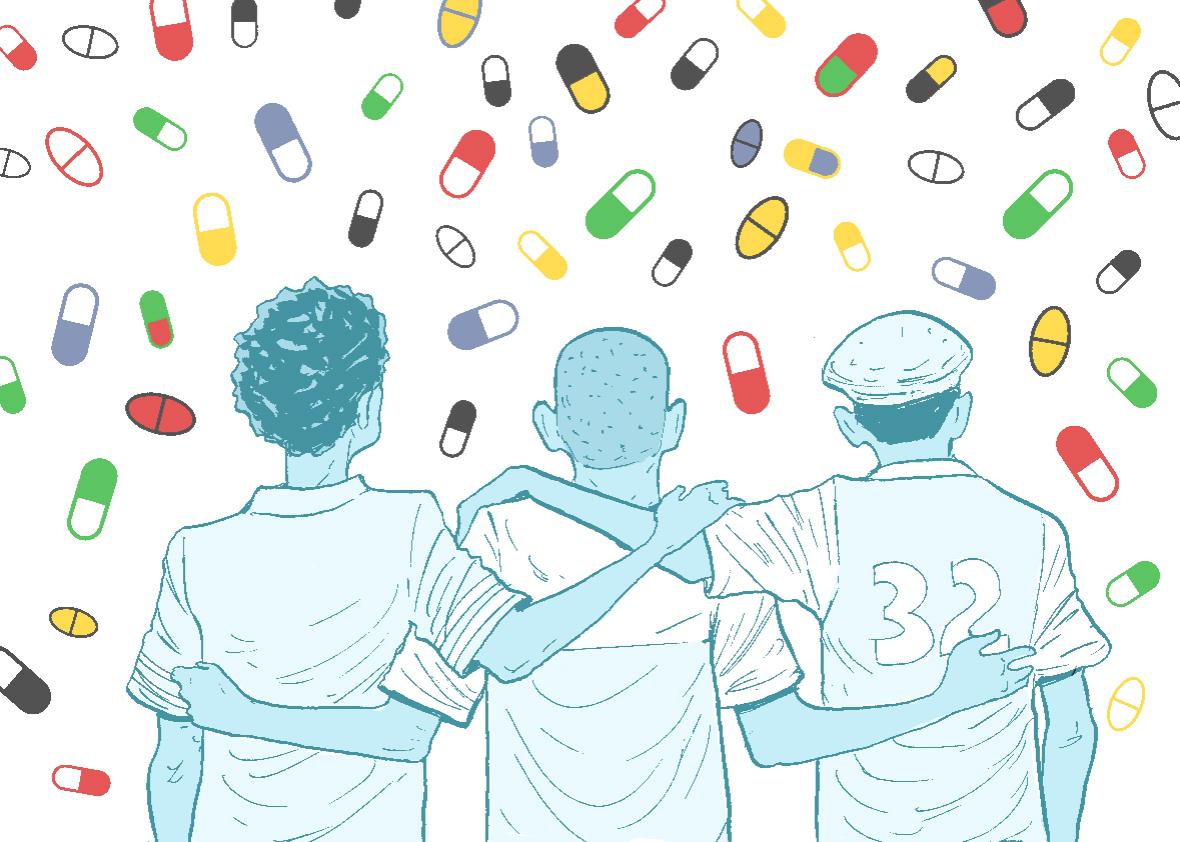I’ll admit that I picked up The Reactive, the first novel by South African writer Masande Ntshanga, with certain expectations. Because the cover tells us that the main character, a young man called Lindanathi Mda, is HIV-positive (a “reactive”) and selling his antiretrovirals on the black market, I hoped for a glimpse into the realities of people living with HIV and AIDS in a country that has been devastated throughout the continuing pandemic. (His surname seems to be an homage to South African playwright and novelist Zakes Mda.) AIDS: It’s the kind of heavy-hitting theme we expect from an African novel—please, educate us! We expect poverty and disease and possibly armed conflict, and we flatten our views of the entire continent much the same way as one of the novel’s minor characters, a French scientist who compresses Africa into a set of health and economic disasters.
Instead, The Reactive is foremost a novel about Nathi’s grief at the death of his half-brother Luthando (or LT) 10 years earlier in a botched initiation ceremony, one in which Nathi avoided taking part despite promises he’d made to LT. And while AIDS, poverty, and politics are not exactly absent from the story, in genre and tone it has much more in common with familiar stories of young urbans staving off adulthood with the help of controlled and industrial substances—as if Judd Apatow directed Jesus’ Son and set it in Cape Town.
“Ten years ago,” Nathi begins, “I helped a handful of men take my little brother’s life,” before shifting to the story of his dissolute, drug-infused existence in 2003. He and fellow wasters Ruan and Cissie are educated and brainy, from middle-income homes, the first generation of black South Africans to access universities previously closed to them during Apartheid. Ruan’s a computer geek who reads Camus; Cissie’s a teacher and frustrated artist. Nathi studied journalism and science and held a job as a lab tech before he became infected. But the three share a sort of existential dread and uncertainty—or maybe, in less romantic parlance, it’s just depression. They meet at a support group for drug users and people with HIV, which Nathi attends to maintain insurance coverage for his ARVs. (Cissie and Ruan aren’t positive but go for reasons related to their work.) Smirking behind their hands during the group leader’s preachy blather, they form an instant bond.
What it lacks in plot The Reactive makes up for with the pleasures of the trio’s spaced-out, deeply inward friendship, unspooling as they drift through their days, organized mostly around their shared project to find buyers for Nathi’s ARVs (which he apparently never takes). In between sales, they sniff regular fingernails of “Industrial” glue, chew stems of khat, smoke crystal, gulp painkillers, stare at the insides of their eyelids, and crisscross Cape Town in crowded taxi-vans. They put up posters advertising their product, wax philosophical, and get a bit nihilist, playing a game called “Last Life,” in which they imagine Nathi’s final year on the planet. It’s all half BS, half serious, classic stoner talk with a nevertheless unfamiliar edge, like Cissie’s observation that they’re all “basically slaves”:
What if babies cry because birth is the first form of human incarceration? What if it’s a lasting shock to the consciousness to be imprisoned inside the human body? If the flesh is something that’s meant to go off from the beginning, doesn’t that make it an ill fit, since the consciousness, naturally amorphous, is antithetical to disintegration?
The story wafts across the pages like smoke rings as today disintegrates into tomorrow. The state of perpetual suspension suits Lindanathi’s name, which we learn means “wait with us,” and through the novel we wait with him and his friends as they dodge and weave under the disappointments and confusions of early adulthood in a country and city in a state of rapid change.

Giorgia Fanelli
The reliable and stuporous lull of the friends’ days is interrupted when an unknown wealthy client contacts them about their ARV supply and makes a large deposit in Ruan’s bank account, a fantastic sum that could, they imagine, remake their stalled lives. At the same time, Nathi starts to receive repeated text messages from his uncle, LT’s stepfather Bhut’ Vuyo, which he would like ignore. The mystery buyer’s hidden motives become the novel’s main narrative engine—insofar as it has one. The unnamed man turns out to be nearly a mythical beast, a man with a badly burnt face and neck who wears a tin mask, speaks and smokes through a device in his neck, issues commands, and transfixes the friends with a series of fables. When they arrive for their second meeting, they find a laptop open and the man on screen, an apparition smoking a cigarette:
He takes a slow drag through the tube in his neck, then lets the smoke funnel back out in a thin plume. It curls at the top of his screen, crowning him with a small firmament. Then he starts to whistle, and in the middle of the frame, his face takes on the form of a dark landscape, rolling unevenly below a blue mist.
While the three friends pursue the truth about the mystery buyer, a series of family losses weaves through Nathi’s memory: uncles and aunts cut down early by disease or by their own hands, and always, his brother LT—“the Screamer,” as the village elders mocked him after the botched circumcision that would kill him. AIDS, too, is a ghost that lives among them, and Nathi often comments that he’ll be dead soon, though for now he has few symptoms. He recalls the pedantic lyric cruelty of his boarding school biology teacher, who took flying lessons and came back with a warning for the class: “She told us how the Earth was gutted open with so many new graves for paupers, that when the clouds parted, they revealed a view from the sky that looked like a giant honeycomb. … Each grave was meant to contain the bodies of twenty adults. She said to us, that is HIV.”
Even with its many ghosts and its implicit critique of the South African government at a time when it refused to make ARVs available through the public sector, The Reactive is largely a novel about Nathi fumbling toward meaning. It does not look closely at the AIDS pandemic or at poverty or politics—but politics inform the novel’s conditions. The lives of Nathi and his friends show how history can shape the opportunities, constraints, ambivalences that mark one young life. As he continues to dodge messages from his uncle Bhut’ Vuyo, Nathi finds himself in a confusing space between his present and his past, when something very different was expected of a young man. He remembers when he and LT were harassed by their uncles, “with their gold teeth and beer breath, and how they’d find the two of us at every family gathering, hoist us on their knees, and goad us about becoming men.” The uncles expected the wrong things from him, a studious boarding-school boy, a kid who “didn’t know his clan name from his asshole.”
When Nathi finally agrees to see Bhut’ Vuyo, it turns out that he’s not that kind of uncle. Instead, he might be able to help Nathi complete his long period of grief. Bhut’ Vuyo and his family live in Du Noon township on a crowded block without plumbing where families and businesses house themselves in shipping containers. “It feels the same as seeing regular poverty,” Nathi thinks, “but cut into sections and prepared for export.”
It’s a wonderful line, and his uncle’s family and neighbors are far more stable and probably happier than Nathi’s friends, an unexpectedly sunny vision that fits the tone of a novel that delivers an unexpected love letter to Cape Town, painting it as a place of frustrated glory. For all its moments of stasis, The Reactive often teems with a beauty that seems to carry on in front of its glue-huffing wasters despite themselves. Lindanathi is a close observer of the city sky and roadscapes, whether eating waffles off a paper plate at the beach, smoking weed on a high-rise balcony, or peering through a smeared taxi windowpane. On one of the daily odysseys with his friends, he muses:
The sky looks dull and impenetrable, like the screen of a malfunctioning cellphone. I imagine it made of plastic, each corner suppressing the passage of vital information. … Perhaps language, having once begun as a system of indistinct symbols, would never develop beyond what we knew, but instead would continue to function as a barrier between ourselves and others.
It’s a fear with which every writer has to contend, and one this haunting and seductive novel goes far to disprove.
—
The Reactive by Masande Ntshanga. Two Dollar Radio.
See all the pieces in the Slate Book Review.
